|
|
|
|
|
|
|
|
|
|
|
|
|
|
|
|
|
|
|
|
|
|
|
|
|
|
|
|
|
|
|
|
|
|
|
|
|
|
|
|
|
|
|
|
|
|
|
|
|
|
|
|
|
|
|
|
|
|
|
|
|
|
|
|
|
|
|
|
|
|
THE GERARD JONES WONDER
MAN INTERVIEW (Page 1 of 3)
|
|
|
|
|
|
|
|
|
|
|
|
|
|
|
|
--A WONDER MAN: COOLER THAN SUPERMAN
EXCLUSIVE--
|
|
|
|
|
|
|
|
|
|
|
|
|
|
|
|
|
|
|
|
|
|
|
|
|
|
|
|
INTERVIEWER: MITCHEL
|
|
|
|
|
|
|
|
|
|
|
|
|
|
|
|
|
|
|
|
|
|
|
|
|
|
|
|
|
|
|
|
|
|
|
|
|
|
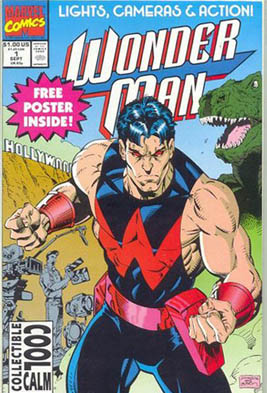 |
|
|
| In
1991 Wonder Man got his first shot at a regular series with editor Fabian
Nicieza, writer Gerard Jones and penciller Jeff Johnson. Although the series
wasn't lacking in ideas and talented people behind it, it wouldn't last
past its 29 issues and two annuals. One thing old Wonder Man fans blame
for its cancellation was the many company wide crossovers during its first
year, its re-invention of the character and its lack of continuity with
previous Wonder Man history. Today recent Avengers writers have made most
of this series tie nicely with Marvel continuity. The series had interesting
stories, great character development and beautiful artwork and even though
it didn't exactly set the comic book business on fire it is still remembered
by many Wonder Man fans with fond memories. It was Wonder Man's first chance
at an ongoing series and a venerable effort. I recently had the opportunity
to correspond with the series writer Gerard Jones and talk about his work
with Wonder Man. |
|
|
|
|
|
|
|
|
1-Could
you tell us how did the Wonder Man series came to be? Where you the first choice
as a writer for the series? Was this the first time a Wonder Man ongoing series
had been planned at Marvel? What is the history behind the series?
|
|
|
|
|
|
|
A:
That was a boom time in comics, and lots of superheroes were being given their
own titles. Fabian Nicieza was a pretty new editor there and Wonder Man was
sort of his mainstream try-out series, I think. |
|
|
|
|
|
|
|
|
|
|
|
|
|
|
|
|
|
|
|
|
|
|
|
|
|
|
|
|
|
|
|
|
|
|
|
|
|
|
|
2-
What was your background as a writer at the time?
|
|
|
|
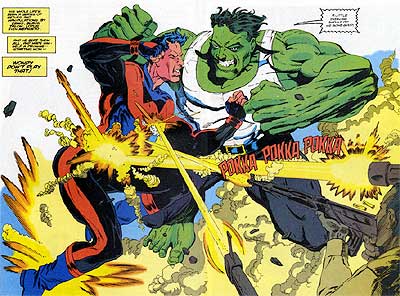 |
|
|
|
|
|
|
|
A:
I was writing quite a bit for DC at the time, especially Green Lantern and Justice
League titles, and Fabian felt I'd be right for WM for my sense of humor and
character. I think he liked the humor in "The Trouble with Girls,"
too. He talked to some other writers too, but I think my proposal was most in
line with the direction he wanted to go. |
|
|
|
3-
Where you familiar with Wonder Man or the Avengers before you started the series?
If so do you have a writer's style or previous vision of the character of Wonder
Man that you used as springboard for your series, lets say David
|
|
Michelinie,
Jim Shooter, Steve Englehart, John Byrne or Roy Thomas? Do you have a favorite
Avengers run? |
|
|
|
A:
I hadn't read Avengers regularly for many years, and had only a vague idea of
Wonder Man. So he was kind of a blank slate to me. I approached him from the
angle, "What would a superhero in Hollywood who wanted to be an actor be
like?" rather than from any previous conception of him. |
|
|
|
|
|
4- What character traits you liked about Simon Williams
before your series started, what character traits you disliked? Was he one
of your favorite Avengers? How would you define the character of Simon Williams?
|
|
|
|
|
|
|
|
|
|
|
|
|
|
|
|
|
|
|
|
|
|
|
|
|
|
|
|
|
|
|
|
|
|
|
|
|
|
|
|
|
|
|
|
|
|
|
|
|
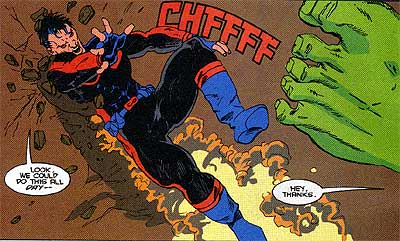 |
|
| A:
I liked the self-absorption and superficiality suggested by some of the scenes
around his acting aspirations--I thought that made an interesting contrast with
his past experiences with death, the depth and darkness of the character, which
would be fun to unfold in the series. I didn't like the fact that his continuity
was so damned complicated, or that the |
|
|
|
|
|
|
character
was so much about his own past. That's why I wanted to take him quickly outside
the whole Avengers/Scarlet Witch reality and jumpstart him with a new life that
didn't refer back to anything. |
|
|
|
|
|
|
|
|
|
|
|
|
|
|
|
|
|
|
|
|
|
|
|
|
|
|
|
|
|
|
|
|
|
|
|
|
|
|
|
|
|
|
5-How
much communication was there between you and the Avengers West Coast creative
team about the direction of Wondy's character, and his relationship with Wanda? |
|
|
|
|
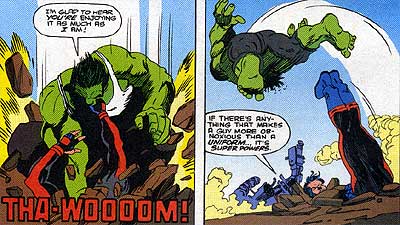 |
|
|
|
|
|
|
|
|
|
|
|
A:
Very little, unfortunately. At the time we started very little was being done
with him in AWC, so we felt like we had a wide open field. When Roy Thomas took
over the series I think he felt frustrated that Wonder Man was so tied up by
the continuity we'd been working out. We just kind of ran our separate shops
thereafter. |
|
|
|
|
|
|
6-Wonder
Man participated in two major crossovers, each of which took up three issues
of the series. Do you think this helped or hurt the book, both in terms of sales
and stories? |
|
|
|
|
|
|
|
|
|
|
|
|
|
|
|
|
|
|
|
|
|
|
|
|
|
|
|
|
|
|
|
|
|
|
|
|
|
|
|
|
|
|
|
|
|
|
|
|
|
|
|
|
 |
|
|
|
|
|
|
|
|
A:
It was a short term boost to sales--the crossover issues did better than the
regular issues, which were only doing moderately |
|
|
|
|
|
|
|
|
|
|
|
|
|
well--but
I think it hurt us long term. That kind of giant, whole-company crossover usually
hurts the more distinctive series long term. It breaks the rhythm, confuses
the regular audience, makes the stories harder to tell. |
|
|
|
|
|
|
|
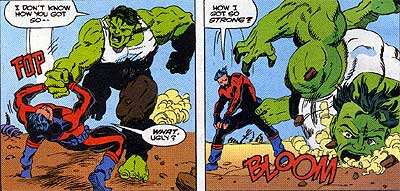 |
|
|
|
|
|
|
|
|
|
|
|
|
|
|
|
|
|
|
|
|
|
|
|
|
|
|
|
|
|
|
|
|
|
|
|
|
|
|
|
|
|
7-
One major storyline of the book was the Savage Wonder Man, which made Simon
more of a Hulk-like character by making his powers tied to his rage. What was
the reasoning behind that change, and do you think it was effective? Also the
series started as a book filled with humor and suddenly after the Galactic Storm
crossover it became a lot more serious with a darker tone. Why such a 360 degree
turn? |
|
|
|
|
|
|
|
A:
I wanted to play more with his non-physical nature, so the emotion/power link
was something I'd been planning to explore all along. But the "savage"
angle happened because it wasn't selling well as a lighter, funnier series.
Savage anger was doing pretty well for Marvel in those years, so it was suggested
that we try that. |
|
|
|
|
|
|
|
|
|
|
|
|
|
|
|
|
|
|
|
|
|
|
|
|
|
|
|
|
|
|
|
|
|
|
|
|
|
|
|
|
|
|
|
|
|
|
|
|
|
|
|
|
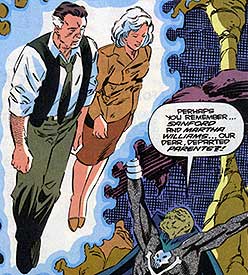 |
|
|
|
|
|
|
|
|
|
|
|
8-
The controversial Hidden Depth storyline made a number of revelations that conflicted
with established continuity (such as Simon's mother being dead, although she
had appeared in a number of AWC issues). Were these changes intentional or accidental?
If they were intentional, what was the reason for the changes? |
|
|
|
|
|
|
|
|
|
|
A:
The continuity errors were just due to my lack of knowledge. I hadn't been able
to read all the old issues. Neither had Fabian. We asked around on some things,
but may not have asked the right people. Someone told me the mom was dead, I
don't remember who. Frankly, I don't think either of us made precise continuity
a real priority. We wanted to get strong stories told. But I understand why
such things annoy devoted fans. |
|
|
|
|
|
|
|
|
|
|
|
|
|
|
9-
In early issues Wondy's agent, Neal, was a slightly darker character; for example,
he set Goliath loose on Wondy as a publicity |
|
|
|
|
|
|
|
|
|
|
|
|
stunt.
However, in later issues Neal was primarily used for comic relief. Do you wish
Neal had been used more in a morally shady role? |
|
|
|
|
|
|
|
|
|
|
|
|
|
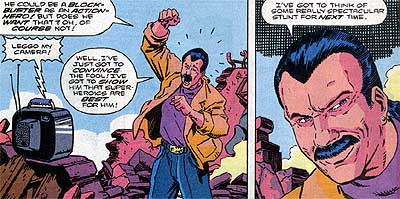 |
|
|
|
|
|
|
|
|
|
|
|
|
|
|
|
|
|
|
|
|
|
|
|
|
|
|
|
|
|
|
|
|
|
|
|
|
|
A:
Neal's darkness worked well against the funnier portrayal of Wonder Man. When
the hero went darker, Neal seemed better as a lighter counterpoint. |
|
|
|
|
|
|
|
|
|
|
|
|
|
|
|
|
10-
In issue #2, you set the Enchantress up to be a major Wonder Man villain, but
she never appeared again (aside from a hallucination in Hidden Depth). Why not?
Was it because Lotus was already filling the role of the seductive villainess?
What |
|
|
|
|
|
|
|
|
|
|
|
|
|
|
|
|
|
|
|
|
|
|
|
|
|
|
|
|
|
|
|
|
|
|
|
|
|
|
|
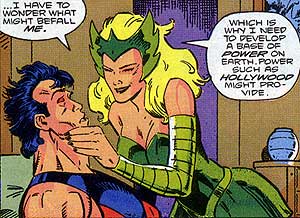 |
|
|
|
|
|
|
|
|
|
|
|
|
|
|
|
inspired
you to make Lotus a major nemesis for this series? |
|
|
|
|
|
|
|
|
|
|
|
|
|
|
|
|
|
|
|
|
A:
I was told that someone else wanted to use the Enchantress for something else.
I'm afraid I don't remember who or what. But that's when I made Lotus the focus.
Since the milieu was Hollywood, which is so much about sexual manipulation,
both in the way movies are sold and the way the business runs, I had to have
a seductive villainess who could play on WM's need for attention. |
|
|
|
|
|
|
|
|
|
|
|
|
|
|
|
|
|
|
|
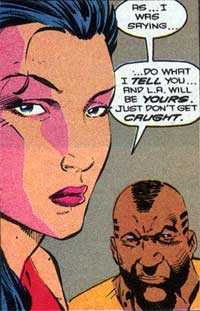 |
|
|
|
|
|
|
|
|
|
|
|
|
|
|
|
|
|
|
|
|
|
|
|
|
|
|
|
|
|
|
|
|
|
|
|
|
|
12-
You introduced a very interesting and very large supporting cast with |
|
|
|
|
|
|
|
|
|
|
|
|
|
|
|
|
|
|
|
|
|
WM.
Who were your favorites? Which ones do you wish you had been able to spend more
time with? |
|
|
|
|
|
|
|
|
|
|
|
|
|
|
|
|
|
A:
I liked Ginger and Spider. They had a lot of twists and depths I hadn't revealed
yet that I was looking forward to exploring. Unfortunately they were so Hollywood,
so earthbound, that the giant crossovers we had to do and the big, dark cosmic
stuff that I was encouraged to bring in when sales were slumping really pushed
them to the margins. |
|
|
|
|
|
|
|
|
|
|
|
|
|
|
|
|
|
|
|
|
|
13-
There were some unanswered questions about the parents of Ginger and Spider
Beach. Was that a story you never got the chance to tell, or simply a mysterious
piece of character background? |
|
|
|
|
|
|
|
|
|
|
|
|
|
|
|
|
|
|
|
A: I was going to tell the story, but time ran out.
Unfortunately, I have no idea anymore what the story was going to be!
|
|
|
|
|
|
|
|
|
|
|
|
|
|
|
|
|
|
|
|
|
|
|
|
|
|
|
|
|
|
|
|
|
|
|
|
|
|
|
|
|
|
|
|
|
|
|
|
|
|
|
|
|
|
|
|
|
|
|
|
|
|
|
|
|
|
|
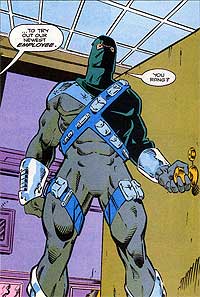 |
|
|
|
|
|
|
|
|
|
|
|
|
|
|
|
|
|
|
14-
Splice was one of my favorite new characters in this series. How did he come
about? Did you plan to explore his background in more detail? |
|
|
|
|
|
|
|
|
|
|
|
|
|
|
|
|
|
|
|
|
|
|
A:
I just wanted one sort of ultimate Hollywood villain, someone who was from and
about the movie industry and represented everything creepy about that business
that Simon was trying to succeed in. I was definitely going to bring him back
and reveal a lot more about him. Glad you liked him! |
|
|
|
|
|
|
|
|
|
|
|
|
|
|
|
|
|
|
|
15-
Your version of Wonder Man seems a lot younger looking than the way he had been
portrayed previously. He seemed to be in his mid to late thirties before but
in your series he looks mid twenties. Was this intentional or just the way Jeff
Johnson drew him? |
|
|
|
|
|
|
|
|
|
|
|
|
|
|
|
|
|
|
A:
That was just Jeff's style. I was writing him in his mid-30s. |
|
|
|
|
|
|
|
|
|
|
|
|
|
|
|
|
|
|
16-
Previously to your series John Byrne had done a visual redesign of the character
were he sported a look very reminiscent of Arnold Schwarzenegger in Raw Deal
with slick short hair. Why the change to a wedge haircut in your series, this
haircut made him look younger too. Also other artists had |
|
|
|
|
|
|
|
|
|
|
|
|
|
|
|
|
portrayed
Wonder Man looking huge even standing next to other Marvel superheroes. Jeff
Johnson's version is of a fit muscular guy but not to those extremes. Later
on Darick Robertson's version in the annual and Tim Hamilton made him look huge
like that. Was this done intentional or that was just Johnson's style? |
|
|
|
|
|
|
|
|
|
|
|
|
|
|
|
|
|
|
|
|
|
|
|
|
|
|
|
|
|
|
|
|
|
|
|
|
A:
You'd have to ask the artists about that, but I think it was personal style.
|
|
|
|
|
|
|
|
|
|
|
|
|
|
|
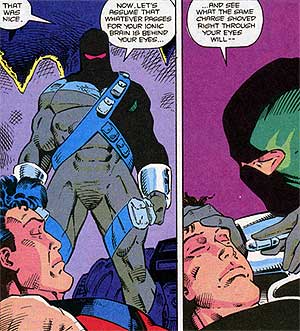 |
|
|
|
|
|
|
|
|
|
|
|
|
|
|
|
|
|
|
17-
Of the artists you worked with was there a style you thought fit the character
better? If you couldn't pick any of the artists you worked with for this series
and you had to pick another one, who do you think would be an excellent match
for a Wonder Man series? |
|
|
|
|
|
|
|
|
|
|
|
|
|
|
|
|
|
A:
I loved working with Jeff. Darick was great too, so was Tim Hamilton, and Ron
and Gordon and everyone, but Jeff and I launched the thing together and his
breeziness and character energy was always part of the conception for me. |
|
|
|
|
|
|
|
|
|
|
|
|
|
|
|
|
|
|
|
18-
You created a sort of a romantic triangle between Wonder Man, Alex Flores and
Ginger Beach, a rectangle if we add the Scarlet Witch, we could even add Amora,
the Enchantress into the mix too. Looks like from all of these ladies your favorite
candidate for a long term relationship with Wonder Man was Alex Flores. Was
she your favorite? |
|
|
|
|
|
|
|
|
|
|
|
|
|
Did
you have plans for all the rest of them in the book? Would you have had him
eventually marry Alex Flores had you stayed with the title? What are your feelings
about him and the Scarlet Witch ending up together and Alex married to another
man in the present stories? |
|
|
|
|
|
|
|
|
|
|
|
|
|
|
|
|
|
|
|
|
|
|
|
|
|
|
|
|
|
|
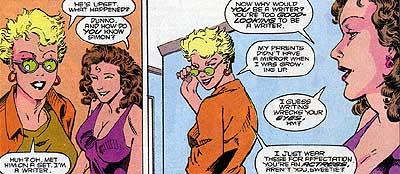 |
|
|
|
|
|
|
|
|
|
|
|
|
A:
I wouldn't have had anyone get married, because I feel it's very, very rarely
that a superhero, or a sitcom character, or any pop-culture icon survives a
fictional marriage without losing much of his strength and appeal. I liked putting
Alex in Wondy's life, though. When I was working in Hollywood I was always struck
how, among all these neurotic goons and career-obsessed morons, |
|
|
|
|
|
|
|
|
|
|
|
|
|
|
|
|
|
|
|
|
|
sometimes
you'd meet someone was just together, who just had a perspective on real life,
and they were so incredibly refreshing to spend even a few minutes with. There
were very grounding when I found them. And I was thinking, here's this character
who isn't just a Hollywood actor, he's also a superhero, his |
|
|
|
|
|
|
|
|
|
|
|
|
|
|
|
|
|
|
|
|
|
|
|
|
|
|
|
|
|
|
|
|
|
|
|
|
|
|
|
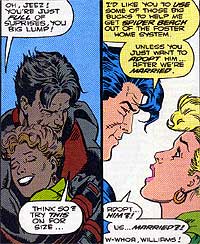 |
|
|
|
|
|
|
|
|
|
|
|
|
|
|
|
|
|
|
|
|
|
|
|
|
|
|
|
|
|
|
|
|
|
|
|
|
|
|
|
|
|
|
|
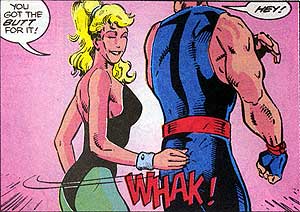 |
|
|
|
|
|
|
|
|
|
|
|
whole
private life is the Avengers, and he isn't even fully human. He's a dead |
|
|
|
|
|
|
|
|
|
|
|
|
|
|
|
|
|
|
|
|
|
|
|
|
|
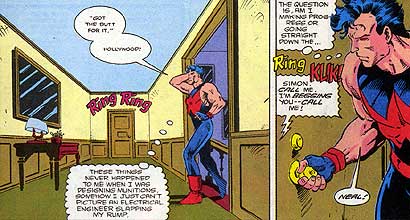 |
|
|
|
|
|
|
|
|
|
guy
who came back as a bundle of ionic energy--the guy's a metaphor for unreality
three or four times over! So he needed someone who was able to be part of his
world, able to help him negotiate through it as a screenwriter might, but would
be reality for him. A kid, a professional attitude toward her work and the industry,
just a piece of real American life that this guy could step into out of his
looney world. But, of course, his world started making her world loony, which
I thought could be very interesting. |
|
|
|
|
|
|
|
|
|
|
|
|
|
|
|
|
|
|
|
|
|
|
|
|
|
|
 |
 |
 |
 |
 |
 |
 |
 |
 |
 |
 |
 |
 |
 |
 |
 |
 |
 |
 |
 |
 |
 |
 |
 |
 |
 |
 |
 |
 |
 |
 |
 |
 |
 |
 |
 |
 |
 |
 |
 |
 |
 |
 |
 |
 |
 |
 |
 |
 |
 |
 |
 |
 |
 |
 |
 |
 |
 |
 |
 |
 |
 |
 |
 |
 |
 |
 |
 |















